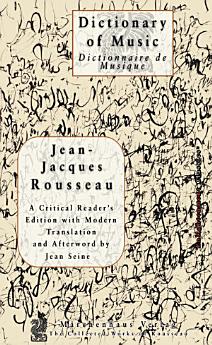Dictionary of Music
About this ebook
Its creation followed his controversial Lettre sur la musique française (1753), which had ignited the "querelle des Bouffons" by favoring Italian opera's melodic simplicity over the perceived artificiality of French music. The work articulates a mimetic theory of musical expression that prioritizes melody over harmony, advancing the philosophical position that music achieves its highest function through direct representation of natural emotional states rather than through complex harmonic constructions. This aesthetic framework reflects Rousseau's broader commitment to immediacy and transparency in human communication, positioning music as a privileged form of intersubjective expression that transcends the artificial conventions of social discourse. The dictionary's conceptual architecture reveals Rousseau's phenomenological approach to musical experience, examining how sonic phenomena generate meaning through their capacity to evoke natural sympathies between individuals while circumventing the mediating structures that corrupt ordinary linguistic communication.
This volume gathers definitions, history, and polemic. Rousseau praises melody, condemns pedantic harmony, and supplies anecdotes from folk practice. It serves both amateurs and nationalists seeking fuel for the Italian cause in Paris. His hatred of academic jargon matches his earlier attack on the sciences. Voltaire derides the book as “little tunes and big talk,” while Diderot worries that Rousseau’s scorn for theory may stunt musical study. Hobbes remains silent here, yet Rousseau’s doubt that art improves souls without moral training fits Hobbes’s bleak view of human passions, though Rousseau blames artifice, not nature.
This modern critical reader's translation from the original French manuscripts includes supplementary materials that bring Rousseau's world and impact to life. This professional translation delivers scholarly depth with amplifying materials. This Reader's Edition includes an illuminating afterword tracing Rousseau's intellectual relationship with Diderot, Voltaire and his reception by Nietzsche, revealing the fascinating dialogue between the period's most influential minds. A comprehensive timeline connects the major events of Rousseau's life with world events, an glossary of Enlightenment terminology frames Rousseau's debates in the intellectual milieu of his day, and a detailed index provides an authoritative guide to his complete writings.











